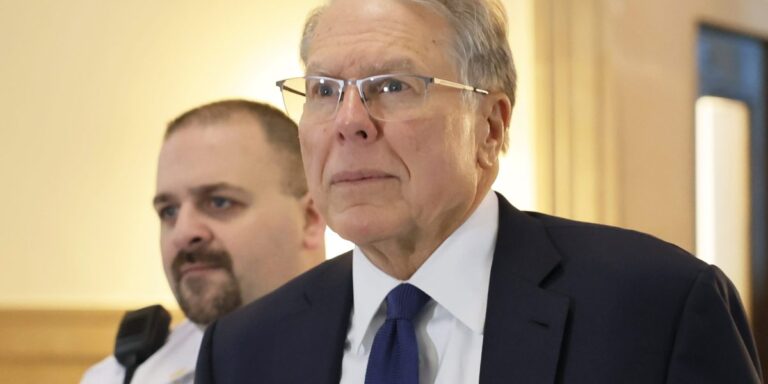
Former National Rifle Association finance chief Wilson “Woody” Phillips has been banned for a decade from handling money for any nonprofit corporation in New York, the state attorney general said Tuesday.
Phillips accepted the ban in May, three months after a The jury found him responsible as part of a scheme to get the influential gun rights organization to fund the NRA’s longtime CEO’s extravagant lifestyle, Wayne LaPierreDetails of the deal were not made public until Tuesday.
Under the agreement, Phillips is barred from serving as a trustee of a nonprofit organization in New York for 10 years and must undergo training before returning to such a position. He must still pay $2 million in damages to the organization. NRA for his role in conceal and allow Stone lavish spending on things like exotic getaways and trips on private jets and superyachts.
The deal means that Phillips, now retired, will not have to participate in the second phase of New York Attorney General Letitia James’ civil trial against the NRA and former top executives next week.
Manhattan Judge Joel Cohen is scheduled to decide remaining issues in the case starting July 15, including whether the elder LaPierre and former attorney general John Frazer should be barred from state charities.
Phillips was accused of approving invoices for LaPierre’s private jet flights to the Bahamas, facilitating payments to contractors owned by LaPierre’s friends and enabling an arrangement whereby the NRA reimbursed its longtime advertising agency, Ackerman McQueen, for travel, makeup and other expenses it covered for LaPierre and his wife.
“For decades, Wilson Phillips oversaw and enabled financial mismanagement and corruption at the NRA, and that is why the jury found him, the NRA and his co-defendants, executives Wayne LaPierre and John Frazer, accountable for their misconduct,” James said in a statement. She said Phillips’ 10-year ban “should serve as an example that my office will hold accountable anyone involved in abuse of power or misappropriation of funds.”
A message seeking comment was left with Phillips’ attorney.
In a statement, NRA attorney William A. Brewer III said: “Today’s announcement distorts the facts and demonstrates the New York attorney general’s motives: to advance his own interests at the expense of the NRA members he claims to protect.
“It is important to note that the agreement does not secure the monetary damages that the jury awarded the NRA against Mr. Phillips – for his participation in schemes that harmed the association. Unfortunately, the agreement does not provide for the recovery of the millions that Mr. Phillips owes,” Brewer said.
The first phase of the trial ended in February when a Manhattan district court jury found that LaPierre had spent millions of dollars of NRA money. The jury said LaPierre must repay the NRA nearly $4.4 million and Phillips owes $2 million.
Jurors found that Frazer had breached his duties, but not that he owed money or that he should be fired from the organization. They also found that the NRA had failed to properly manage its assets, had omitted or misrepresented information in its tax returns and had violated whistleblower protections under New York state law.
A third co-defendant, LaPierre’s former chief of staff Joshua Powell, reached a deal with James’ office just before the trial began in January. Powell, who described “staggering” waste and corruption in his 2020 book “Inside the NRA,” agreed to testify at trial, pay the NRA $100,000 and forgo any further involvement in nonprofit organizations.
LaPierre announced his resignation on the eve of the trial. In May, the NRA elected Doug Hamlin, the executive director of its publications division, to replace him. At the same time, Frazer was removed as general counsel, but he remains the NRA’s corporate secretary. Phillips retired in 2018.
In 2020, James sued the NRA and its leaders under its authority to investigate nonprofits registered in the state. She initially sought to dissolve the entire organization, but Cohen refused. governed in 2022 that the allegations did not warrant a “corporate death sentence.”
The trial has shed light on the leadership, organizational culture and finances of the powerful lobbying group, which was founded more than 150 years ago in New York to promote shooting skills and grew into a political juggernaut that influenced federal law and presidential elections.
In the second phase of the lawsuit, James seeks to appoint an independent monitor to oversee the administration of the NRA’s charitable assets.
James also seeks to bar LaPierre from holding leadership positions in any charity that does business in New York, and wants the NRA and Frazer banned from raising money on behalf of any charity operating in the state.
“New Yorkers deserve to know that when they support a nonprofit, those donations are being used to advance its mission, not wasted on lavish perks for staff or cronies,” James said.
__
Associated Press writer Anthony Izaguirre in Albany, New York, contributed to this report.


